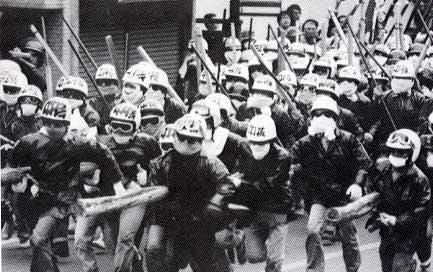Hi all,
Thank you for joining me for this Sunday Special commentary.
Comments and questions are welcome. Please be respectful of others’ opinions if they should differ from yours.
If you’d like to hear the songs before you read the background, I’ve included YouTube videos below the article.
Synonyms and/or definitions for vocabulary words in bold are provided below. If you have the Substack app on your phone, you can LISTEN to the article as you read.
(927 words)
Today, I have a special guest, Masaki Hirata. He is an associate professor at Nagoya City University, and his main fields of research are the Vietnam War, peace and justice studies. He has also been actively involved in various social justice issues. In particular, he has been working with Masaichi and Mieko Hattori. Their son, Yoshihiro, was shot to death in Louisiana on October 17, 1992. Yoshi, an exchange student, was on his way to a Halloween party when he stopped at a house to ask for directions and was shot. The Hattoris have been working for over 30 years urging the US to change its gun laws.
Masaki is also trying to change the system by which decisions are made at his university, a system he thinks is unfair and undemocratic. He holds a weekly lunchtime “protest” in the quad area, singing songs and giving short speeches to passersby about working together to make positive changes in university policies.
Masaki has been a subscriber to Social Issues in Song since its beginning. He recently sent me the lyrics to a song called What We Want, written in 1970 by Nobuyasu Okabayashi. In an email back-and-forth, we discussed the song.
Louise: What was the reason you emailed me about What We Want?
Masaki: At my regular musical protest this week, I sang this Japanese protest song for the first time. Last Wednesday, at a hall in Kanayama, I went to Okabayashi’s live performance celebrating the 55th anniversary of his musical career. He was really popular among Japanese baby boomers and was called “the God of folk music”.
Louise: I’m familiar with his song, Tomo yo (Friend).
Masaki: Wow, you already know him and that song. Great. You know what, two years ago, he released a new album for the first time in 23 years. It’s called The Morning of the Resurrection. In that album, he included a song, Tomo yo, kono tabi wo (Let’s go on this journey, friend). The music is a great as Tomo yo.
Louise: Thanks for the suggestion. I’ll look into it!
Well, let’s take a look at the lyrics:
What we want is not the suffering of living
What we want is the joy of living
What we want is not a self living for society
What we want is a society for ourselves
What we want is not to be given
What we want is to fight for what we want
What we want is not to kill you
What we want is to live with you
Do not remain in the current unhappiness
Leap now into the yet unseen happiness
What we want is not repetition
What we want is constant change
What we want is never “we”
What we want is to continue being individuals
I’m guessing that this song from the 1960s - a turbulent time here in Japan as it was worldwide - is about young people’s demands for changing society. However, the final lyrics seem to say something completely different:
What we want is not the joy of living
What we want is the suffering of living
What we want is not to live with you
What we want is to kill you
Could you tell us a little more about what was happening in Japan at that time? It almost seems like the lyrics are applicable today but in a completely different way. One side singing for peace - the other side wanting destruction.
Masaki: You point out a really interesting thing about What We Want. Yes, I intentionally avoid singing the last verse. If I sing this end part now in 2023, the audience, especially younger people, might misunderstand the message of the song. It’s really sad to say that. I think that the song is about the contradictory feelings which people driven into a corner tend to have. For example, I imagine the feelings of people who are obliged to live in a war zone. Some might want the spread of love to end the killing as soon as possible, but some might want violent retaliation with hate caused from the death of their loved ones.
Louise: So, that might have been how the Japanese students were feeling?
Masaki: Given Japan’s era back then, I imagine the feelings of the students on campus. In 1968, the students at many Japanese universities began to stand up for peace, freedom, and justice by nonviolent means like sit-ins and by occupying universities.
Louise: That’s similar to what happened in France and the US. But the university officials were not happy about it, right?
Masaki: Not at all. The universities stopped having any dialogue with the students at some point and began to brutally crack down on them by introducing the police force. The students were beaten up, tear-gassed, and many were seriously injured. The iconic image was the fall of Tokyo University in January, 1969, which was the beginning of the end of the student movements.
Then, in Feb 1972, the Aasama Sanso incident by armed young people who belonged to the United Red Army closed that era.
Louise: How does What We Want fit with that time in history?
Masaki: You can interpret these lyrics from 1970 as the reflection of hope and despair the young people at the time had actually felt throughout their entire experiences in the movement. Okabayashi’s Tomo yo, written in 1968, was full of hope. What a change...
Louise: Thank you, Masaki. I will include the video of Tomo yo below that of What We Want. I’m sure many readers would be interested in hearing that song as well.
VOCABULARY
urge - encourage, try to persuade
passersby - people walking by
baby boomer - someone who was born in the years after World War II
resurrection - coming back to life
leap - jump, jump over
repetition (n.) - repeating, reoccurrence, duplication [repeat (v).]
turbulent - stormy, unstable, chaotic, full of ups and downs
applicable (n.) - relevant, related to, connected to [apply (v).]
destruction (n.) - tearing down, pulling down, smashing [destroy (v).]
intentional (adj.) - done on purpose, planned, thought out in advance [intend (v).]
contradictory - opposite or inconsistent
be obliged to - be required to, be made to do
retaliation - getting even, vengeance, revenge, payback, counterattack
brutally - in an extremely violent way
What We Want
Tomo yo







Thank you so much for this song. I was not familiar with it. It is so relevant to today’s struggles. I was also so touched to learn that the Hattoris have been working for 30 years to get some change in US gun laws. Such commitment is inspiring. May they and we see change in our lifetimes.
Thanks for introducing me to this folksinger from an era I lived through in the U.S. Please say hello to my good friend Masaki for me. Tell him I miss him and hope to see him again some day.
Tom Bauerle